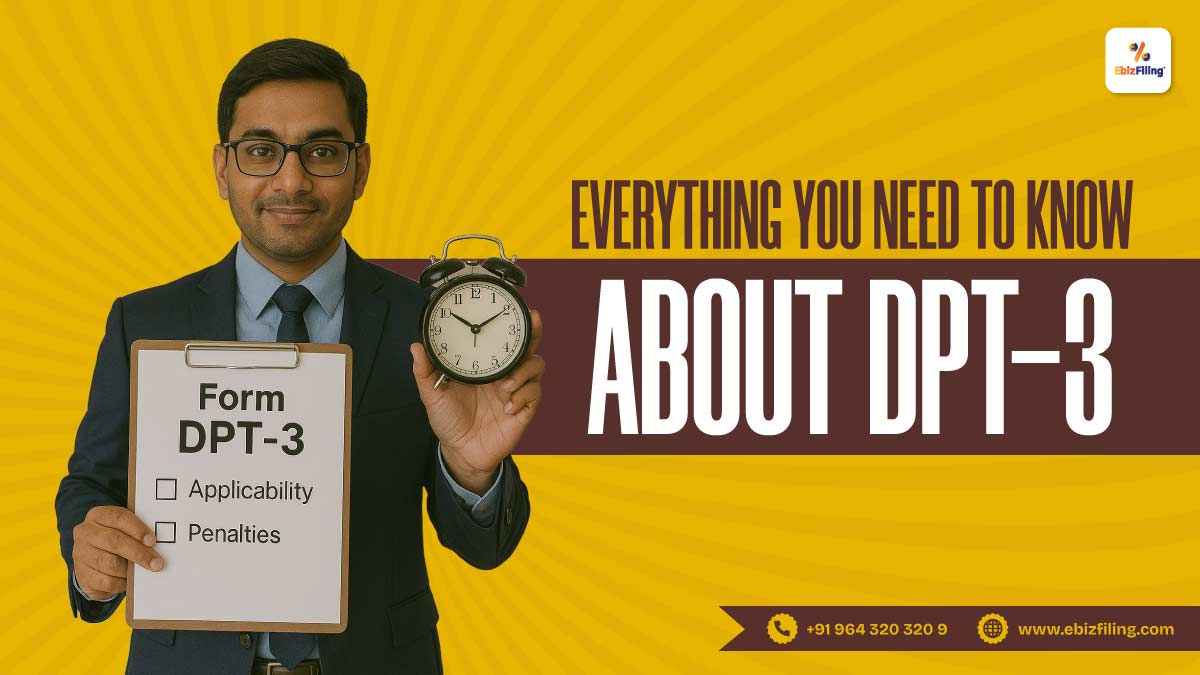What is Form DPT-3?
Form DPT-3 is a report that companies need to file with the Ministry of Corporate Affairs (MCA).
It provides details about:
- Deposits the company has taken from others
- Loans that the company still owes
- Advances or other amounts that aren’t considered deposits
Purpose of DPT-3
- To keep things clear and transparent about how companies get and use money from members and others.
- To help the MCA monitor funds that aren’t deposits but could still be misused.
Who Needs to File DPT-3?
All companies are required to file Form DPT-3, except for the following:
- Government companies
- Banking companies
- Non-Banking Financial Companies (NBFCs) that are registered with the Reserve Bank of India (RBI)
This means that the filing applies to:
- Private Limited Companies
- Public Limited Companies
- One Person Companies (OPCs)
- Small Companies
If your company doesn’t fall under the excluded categories, you need to file DPT-3 to stay compliant.
DPT-3 Filing Deadline
The regular deadline to file Form DPT-3 is every year by 30th June, covering all disclosures up to 31st March of that year.
If you’re doing a one-time filing for past cases (when required), you must submit it within 90 days from the date the government notifies you.
Types of DPT-3 Filings
- Annual Return of DepositsFile this if your company has accepted deposits from people as defined under the Companies Act.
- Return for Amounts Not Treated as DepositsUse this to report money your company has received that isn’t counted as a deposit, like unsecured loans, advances, or other similar amounts.
Documents Required
- Auditor’s certificate, if your company needs one
- A copy of the board resolution approving the filing
- List of people or entities who have given deposits, if any
- Copy of the trust deed, if it applies to your company
- Any other information asked for in the form
How to File Form DPT-3 – Step by Step
- Log in to the MCA Portal: Go to the Ministry of Corporate Affairs (MCA) website and log in using your company’s username and password.
- Download and Fill the Form: After logging in, download the DPT-3 e-form. Fill in all the details carefully, like the deposits, loans, and advances your company has received.
- Attach the Required Documents: Keep the following documents ready:
- Auditor’s certificate (if needed)
- Board resolution
- List of deposit holders (if any)
- Trust deed (if it applies)
- Any other required papers
- Sign with a DSC: The form must be signed digitally using a Digital Signature Certificate (DSC) by an authorized person, like a director or company secretary.
- Submit and Pay the Fees: After checking everything, submit the form online through the MCA portal. Make sure to pay the required filing fee to complete the process.
Penalties for Not Filing Form DPT-3 on Time
If a company doesn’t file Form DPT-3 by the due date, there are penalties to keep in mind:
- For the Company: The company will have to pay a fine of ₹5,000 initially. On top of that, there’s an extra charge of ₹500 for each day the filing is delayed. So, the longer the delay, the higher the penalty.
- For the Responsible Officers: The directors or officers who are responsible for filing the form will also face the same penalties- ₹5,000 plus ₹500 per day of delay.
- Giving Wrong Information Has Serious Consequences: If your company gives false details or doesn’t report deposits correctly in Form DPT-3, strict penalties can apply under Section 76A of the Companies Act. This can include heavy fines or even legal action.
So, it’s essential to file the DPT-3 on time and provide accurate information to avoid these fines and complications.
Common Mistakes to Avoid While Filing Form DPT-3
- Thinking Private Companies Are ExemptSome assume private companies don’t have to file. That’s incorrect.All companies, including private ones, must file DPT-3 unless they’re a government company, bank, or NBFC registered with RBI.
- Not Reporting Non-Deposit AmountsDon’t forget to include amounts like loans, advances, or other funds received.Even if they’re not deposits, they still need to be shown in the form.
- Missing the DeadlineThe last date to file DPT-3 is usually June 30 every year.Missing it means you may face penalties, so set a reminder and don’t wait till the last minute.
- Filing Incomplete or Wrong InformationMistakes or missing details can cause delays or even lead to an inspection.Double-check everything before you submit.
Conclusion
In short, it’s important for every company to file Form DPT-3 properly and on time. Doing this helps you follow the law and avoid fines. Being careful and organized with your filing makes things easier and keeps your company’s financial records in good order with the government.
Suggested Read :
Pvt Ltd Company Compliance Checklist
Company Name change compliances
Compliances for Registered Office changes
File Form STK-2 for Closing a Company











December 24, 2025 By Dhruvi D
Private Limited Company Incorporation in India with Ebizfiling Introduction At Ebizfiling, we simplify the process of Private Limited Company incorporation in India for aspiring entrepreneurs and small business owners. When you’re starting a new venture, our team ensures your registration […]
December 24, 2025 By Dhruvi D
Important Guidelines for OPC Incorporation in India with Ebizfiling Introduction At Ebizfiling, we aim to make your OPC incorporation journey smooth, transparent, and fully compliant with Indian laws. Being an aspiring entrepreneur venturing into a One Person Company, it’s important […]
September 22, 2025 By Dhruvi D
Minimalist Compliance Strategy for OPCs Introduction This Minimalist OPC Annual Compliance strategy focuses on fulfilling only the essential compliance requirements needed to run a One-Person Company efficiently. This approach reduces unnecessary burdens by prioritizing strategic tasks, using digital tools to […]